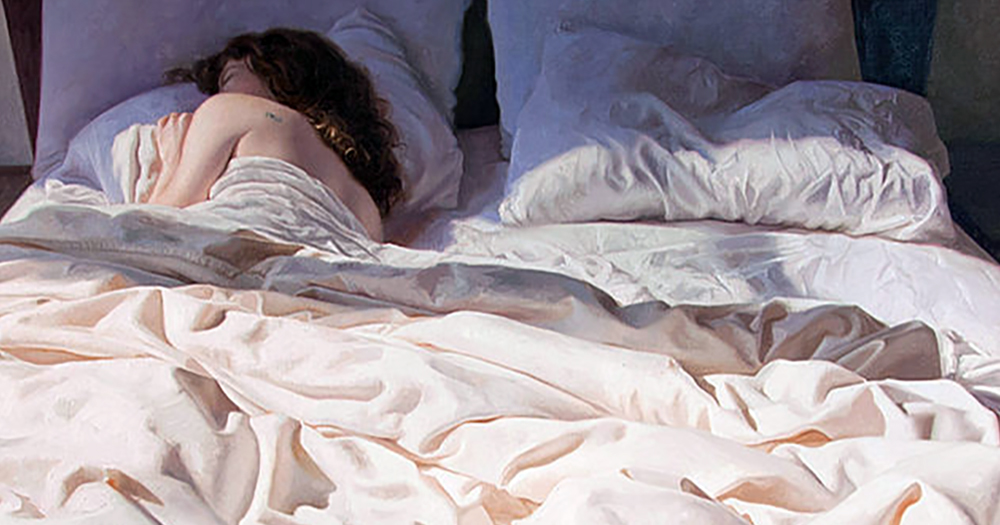Obligatory Scene opens with the construction of a bedroom – that is to say the furnishing of the room, and the construction of the bed itself from frame, mattress and blankets. Two women carry in and position furniture, then laugh and kiss as they try to make the metal pieces of the bed frame fit together.
We don’t know who these women are at first. After a scene break that brings a jump forward in time, though, they soon introduce themselves as the play’s central characters: grad students Vivey and Dru, a married couple who aren’t having sex anymore.
Dru is happy with the lack of physical intimacy; Vivey is not. Both are deeply unhappy with the emotional distance that has grown between them. And so the construction of the bed gives way to a debate on the constructedness of sexuality, gender roles and to what extent it’s possible to healthily enjoy lesbian sex in a world where all sexual pleasure is conditioned by exposure to rape culture.
The hyper-intellectualism of the play’s two central characters, who approach the problem of their own sex life via an argument over Shakespeare’s The Taming of the Shrew, barely conceals a vulnerability beautifully revealed by actors Carli Rhoades and Alice Kabia. Readers of Sally Rooney will know the type: these characters are better at discourse than they are at communication, but their attempts to understand one another make them likeable despite their flaws.
The couple’s sexual problems are coloured by Dru’s history of sexual abuse, a backstory that writer Carolyn Gage and director Amelia Cain handle deftly and with respect. The writing is witty, warm and hard-hitting, but many of the strongest moments in this production are unspoken.
When Vivey and Dru are unable to explain their feelings out loud, their body language speaks loud and clear. The impact of these silent moments is a testament to the acting abilities of Rhoades and Kabia, and to Cain’s skill as a director.
It’s no accident that Obligatory Scene is presented at the International Dublin Gay Theatre Festival as part of a double bill, preceded by Miss Furr and Miss Skeene – a short play based on Gertrude Stein’s word portrait of gay artists Ethel Mars and Maud Hunt Squire, adapted by Lynn C Miller. The shorter piece, as well as being fascinating in its own right, sets the scene for an intimate discussion of lesbian sexuality, contextualised and intruded on by the political discourse that has always surrounded lesbian sex.
Presented as a pair, the two plays offer a candid look at the efforts gay women have made across history to live happy lives together in a sexist world – and a powerful tribute to the courage these women have shown.
Obligatory Scene, along with Miss Furr and Miss Skeene, is on every night at 9.00pm from 14th-18th May at the Teachers’ Club, with an extra 4.00pm performance on Saturday 18th. You can buy tickets at the door, or on their website.
© 2019 GCN (Gay Community News). All rights reserved.
Support GCN
GCN is a free, vital resource for Ireland’s LGBTQ+ community since 1988.
GCN is a trading name of National LGBT Federation CLG, a registered charity - Charity Number: 20034580.
GCN relies on the generous support of the community and allies to sustain the crucial work that we do. Producing GCN is costly, and, in an industry which has been hugely impacted by rising costs, we need your support to help sustain and grow this vital resource.
Supporting GCN for as little as €1.99 per month will help us continue our work as Ireland’s free, independent LGBTQ+ media.
